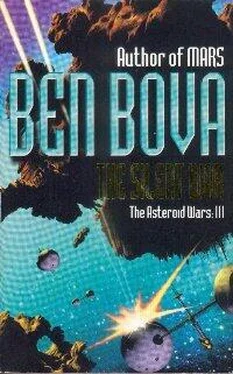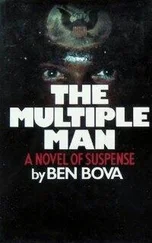Harbin paid no attention to anything but the main screen. The Astro vessels were in the path of a speeding avalanche of stones as most of Samarkand’s erstwhile shielding came plunging toward them.
“Keep the stones between us and them,” Harbin told the pilot. “We can still use them to shield us.”
The display screen was filled with the rubble now. Harbin saw a brief splash of laser light as one of the Astro warships fired into the approaching avalanche. With his armrest keyboard he widened the scope of the display.
The Astro captains knew what had happened to Gormley, too. For a heartstopping few seconds they maintained their formation, but then their nerve broke and the two escorting warships scattered, leaving the bigger, more ponderous freighter squarely in the path of the approaching stones.
The freighter tried to maneuver away from the avalanche but it was too slow, too cumbersome to escape. Its captain did manage to turn it enough so that its bulky cargo of asteroidal ores took the brunt of the cascade.
Harbin watched, fascinated, as the blizzard of rocks struck the freighter. Most of them hit the massive cargo of ores that the ship carried in its external grippers. Harbin saw sparks, puffs of dust, as the stones struck in the complete silence of airless space.
“I wouldn’t want to be in that shooting gallery,” the executive officer muttered. Harbin glanced away from the screen momentarily, saw that the weapons tech was tending to the comm technician, who was sitting up woozily in her chair.
The rocks continued to pound the freighter. Harbin saw a flash of glittering vapor that quickly winked out. Must have hit part of the crew module, he thought. That was air escaping.
“Where are those two escort ships?” he asked aloud.
The pilot chuckled. “On their way back to Selene, from the looks of it.”
Why not? Harbin thought. They don’t have a ship to escort anymore. Why risk their butts in a three-against-two engagement?
He called his two other ships and told them to stand by in case the two Astro warships returned. Then he commanded his pilot to move Samarkand closer to the crippled freighter.
“We’ve got to finish her off,” he said.
The pilot asked, “Do you want me to open a frequency to her? I can take over the comm console, sir.”
Harbin shook his head. He had no desire to talk with the survivors, if there were any still alive aboard the freighter. His job now was to complete the destruction of the ship, which meant that anyone still breathing aboard her was going to die.
“No need to talk to them,” he said to the pilot. Then, to the weapons tech, “Get back to your post and arm the lasers. Time to finish this job.”
SELENE: ASTRO COMMAND CENTER
Admiral Wanamaker had expected his intelligence officer to be excited, or perhaps worried. Instead, she looked deadly calm. And determined.
“Willie,” he said, “I can’t let you go on this mission. I’m sure you understand why.”
Tashkajian remained standing in front of his desk, her dark eyes unwavering. “This mission is my idea, sir. I don’t think I should expect others to take risks that I’m not prepared to take myself.”
Gently, trying not to injure her pride, Wanamaker said, “But I need you here, Willie. You’re my intelligence officer, and a damned good one. I can’t afford to risk you.”
Her steadfast pose faltered just a little. “But, sir, it’s not right for me to stay here while the crew dashes out to the Belt inside that radiation cloud.”
He smiled slightly. “You assured me it was perfectly safe, Willie.”
“It is!” she blurted. “But… well, you know, there’s always a chance…” Her voice trailed off for a moment, then she snapped, “Dammit, sir, you know what I mean!”
“Yes I do,” he admitted. “But you’re not going. You’ve picked a crew and the ship is ready to go out inside the radiation cloud to attack the HSS base at Vesta. You are staying here, where you belong. Where I need you to be.”
“That’s not fair, sir!”
“I have no intention of being fair. This is a war we’re fighting, not some playground game.”
“But—”
“The ship goes without you,” Wanamaker said, as firmly as he could manage. “That is final.”
“Welcome to Shining Mountain Base,” said Daniel Tsavo, beaming so widely Pancho thought she could see his molars.
He was standing at the end of the flexible tube that had been snaked out to the hopper from the airlock of the base structure.
Shifting the travel bag on her shoulder, Pancho took his extended hand, smiling back at him, and looked around. The interior of the Nairobi facility looked bare-bones, no-nonsense efficiency. Undecorated metal walls. Ribbed dome overhead. Tractors scuffed and grimy with lunar dust.
“Nice of you to invite me,” Pancho said, knowing that she had actually invited herself.
“I’m glad you got here before the solar storm strikes. We’ll be safely underground before the radiation begins to mount.”
“Sounds good to me,” said Pancho.
Tsavo led her to a pair of gleaming metal doors. They slid open to reveal an elevator.
“Most of our base is underground, of course,” he said as he gestured her into the cab.
“Just like Selene.”
“Just like Selene,” he agreed as the doors slid shut and the cab began dropping so fast Pancho’s stomach lurched.
Wanamaker had been dead-set against this visit. When Pancho had told him she was going to look over the Nairobi base, his holographic image had turned stony.
“Pancho, the head of the corporation shouldn’t walk into a potential enemy base all by herself.”
“Enemy?” Pancho’s brows had shot up. “Nairobi’s not an enemy of ours.”
“How do you know?” Wanamaker had demanded. “You’re at war, Pancho, and anybody who isn’t an ally is potentially an enemy.”
Pancho didn’t believe it.
“At least take a security team with you,” Wanamaker insisted.
“I can take care of myself.”
As Tsavo guided her along the tunnels of the Nairobi base, though, Pancho began to wonder about her bravado. The place was larger than she had expected, much larger. Construction crews in dark blue coveralls seemed to be everywhere, drilling, digging, hauling equipment on electrically powered minitractors, yelling to each other, lifting, banging. The noise was incredible and incessant. Tsavo had to shout to make himself heard. And everything smelled brand new: fresh paint, concrete dust, sprays of lubricants and sealants in the air.
Pancho smiled and nodded as Tsavo shouted himself hoarse explaining what they were walking through. Living quarters would be there, offices on the other side of that corridor, laboratories, storerooms, a big conference room that could be converted into a theater, the base control center: all still unfinished, raw concrete and lunar rock and plans for the future.
Many of the workers were Asians, Pancho saw.
“Contract labor,” Tsavo explained, his voice getting rougher with each word. “They have the experience and skills, and they are cheaper than training our own people.”
Deeper and deeper into the base they walked, down inclined ramps marked TEMPORARY ACCESS and through tunnels whose walls were still bare rock.
Jeeps, Pancho thought, this place is huge. They’re really building a city here, sure enough.
She hoped that the minibeacon her communications people had planted under the skin of her left hip would be able to send its coded signal through the rock. Jake’s put up a set of six of polar orbiting satellites to keep track of me, she reminded herself; there’d be one close enough to pick up my signal all the time. I’ll be okay. They’ll know exactly where I am.
Читать дальше












